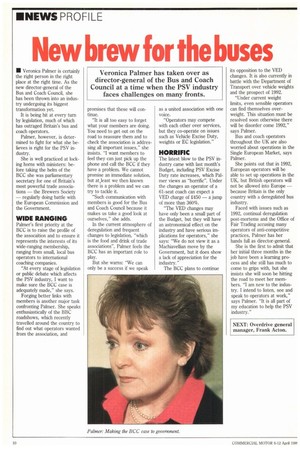New brew for the buses
Page 12

If you've noticed an error in this article please click here to report it so we can fix it.
Veronica Palmer has taken over as director-general of the Bus and Coach Council at a time when the PSV industry faces challenges on many fronts.
• Veronica Palmer is certainly the right person in the right place at the right time. As the new director-general of the Bus and Coach Council, she has been thrown into an industry undergoing its biggest transformation yet.
It is being hit at every turn by legislation, much of which has outraged Britain's bus and coach operators.
Palmer, however, is determined to fight for what she believes is right for the PSV industry.
She is well practiced at locking horns with ministers: before taking the helm of the BCC she was parliamentary secretary for one of Britain's most powerful trade associations — the Brewers Society — regularly doing battle with the European Commission and the Government.
WIDE RANGING
Palmer's first priority at the BCC is to raise the profile of the assocaition and to ensure it represents the interests of its wide-ranging membership, ranging from small, local bus operators to international coaching companies.
"At every stage of legislation or public debate which affects the PSV industry, I want to make sure the BCC case is adequately made," she says.
Forging better links with members is another major task confronting Palmer. She speaks enthusiastically of the BBC roadshows, which recently travelled around the country to find out what operators wanted from the association, and promises that these will continue.
"It is all too easy to forget what your members are doing. You need to get out on the road to reassure them and to check the association is addressing all important issues," she insists. "I want members to feel they can just pick up the phone and call the BCC if they have a problem. We cannot promise an immediate solution, but at.least we then known there is a problem and we can try to tackle it.
"Such communication with members is good for the Bus and Coach Council because it makes us take a good look at ourselves," she adds.
In the current atmosphere of deregulation and frequent changes to legislation, "which is the food and drink of trade associations", Palmer feels the BCC has an important role to play.
Butshe warns: "We can only be a success if we speak as a united association with one voice.
"Operators may compete with each other over services, but they co-operate on issues such as Vehicle Excise Duty, weights or EC legislation."
HORRIFIC
The latest blow to the PSV industry came with last month's Budget, including PSV Excise Duty rate increases, which Palmer views as "horrific". Under the changes an operator of a 61-seat coach can expect a VED charge of .9.450 — a jump of more than 360%.
"The VED changes may have only been a small part of the Budget, but they will have an astronomical effect on the industry and have serious implications for operators," she says: "We do not view it as a Machiavellian move by the Government, but it does show a lack of appreciation for the industry."
The BCC plans to continue its opposition to the VED changes. It is also currently in battle with the Department of Transport over vehicle weights and the prospect of 1992.
"Under current weight limits, even sensible operators can find themselves overweight. This situation must be resolved soon otherwise there will be disorder come 1992," says Palmer.
Bus and coach operators throughout the UK are also worried about operations in the Single European Market, says Palmer.
She points out that in 1992, European operators will be able to set up operations in the UK, but British operators will not be allowed into Europe — because Britain is the only country with a deregulated bus industry.
Faced with issues such as 1992, continual deregulation post-mortems and the Office of Fair Trading accusing many operators of anti-competitive practices, Palmer has her hands full as director-general.
She is the first to admit that her initial three months in the job have been a learning process and she still has much to come to grips with, but she insists she will soon be hitting the road to meet her members. "I am new to the industry. I intend to listen, see and speak to operators at work," says Palmer. "It is all part of my education to help the PSV industry."




















































































































